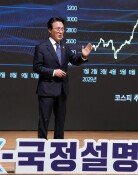Korea Marginalized in FTA Deals
Korea Marginalized in FTA Deals
Posted September. 21, 2003 22:44,
Korea is facing a serious crisis of being marginalized in the newly emerging trend of forming the Free Trade Agreements (FTAs) worldwide.
The Ministry of Foreign Affairs and Trade (MOFAT) announced yesterday that Chile, the first country Korea signed the FTA with, postponed the Senate voting on the Korea-Chile FTA bill to nest month.
A MOFAT official said, ˝Chile is offended by the procrastination of the Korean National Assembly in approving the bilateral FTA.˝
The delayed conclusion of the FTA is expected to trigger other problems to Korea, such as loss of the nation`s credibility, worsened competitiveness for exporters, a hitch in forming FTAs with others countries, and so on.
▽FTA is a global trend in trading.
Recently, FTAs, allowing non-tariff to the countries concerned, have rapidly risen among countries and have become a common trend in global trade.
For 47 years from the establishment of the General Agreement on Tariffs and Trade (GATT) in 1947 to 1994, right before the launching of the World Trade Organization (WTO), 125 FTAs including a customs union have been concluded. Between 1995 and 2003, the number soared to 130 with over 70 cases undergoing.
As the fifth ministerial talks at WTO in Cancun, Mexico ended on September 14 without a tangible result, countries in the world began to hurry in entering into FTAs with each other instead of pursuing the multilateral Doha Development Agenda (DDA).
In November 2002, the first-ever FTA in Asia took effect between Japan and Singapore. After a while, China, India, Japan, and the Association of South-East Asian Nation (ASEAN) signed or agreed to sign FTAs.
In a report on trends of forming FTA s in Asian region, the Trade Research Institute (TRI) reported that when the ongoing FTA negotiations are concluded and the FTA takes effect, FTAs` share of exports would grow from 22.8% to 31.3% in the ASEAN region, and from 20.9% to 29.2% in Thailand.
▽Koreas credibility overseas is freefalling.
˝As the Korea-Chile FTA is delayed, Korea is losing its reliability as a FTA partner from the world˝, said Kim, Chang-gyu, head of the International Partnership Panning Department at the ministry of Commerce, Industry, and Energy (MOCIE).
Choi, Nak-gyun, senior researcher at the Korea Institute for International Economic Policy (KIEP) analyzed, ˝Korea`s negative images including the nation`s defamed credibility explained why Mexico recently refused Korea`s offer to sign a FTA.˝
Kim, Young-jun, diplomatic official of the Department of Multilateral Trade Cooperation at the MOFAT also noted, ˝Let alone Chile, Japan, Singapore, and Mexico are becoming less friendly to Korea in dealing with FTA issues.
President Andres Saldivar of the Chilean Senate said, in a recent interview with the Chilean daily newspaper, La Estrategia, ˝The Korean National Assembly must show sincerity in dealing with the Korea-Chile FTA bill.˝
▽Deteriorating Korea`s competitiveness in export.
Korea`s losing out in FTA deals worldwide will translate into deteriorating the national competitiveness in export.
An FTA allows its parties concerned special favors, such as non-tariffs in exporting. This means that Korean companies should bear the brunt of disadvantages in trading.
In Chilean markets, Korean automobiles occupied 20.2% of the market in periods from January to April last year, yet the market share dropped to 13.8% this year over the same period. Mobile phones are losing in the battle as well.
This is because Chile began to import car and mobile phones en masse from the EU, Argentina, Paraguay, Brazil, and Uruguay as the bilateral FTAs took effect.
The MOFAT forecast that the proportion of FTAs to global trades would grow to 55% by 2005 from 43% in 2002.
˝As more trade occurs between FTA signatories, Korea will lose its overseas markets and competitiveness at the same time˝, concerned Chung, Jae-wha, head of FTA team at the TRI.
Eun-Woo Lee Chan-Sun Hong libra@donga.com hcs@donga.com



![넘치는 전재수 과거 사진들…유죄의 증거일까, 무죄의 증거일까[청계천 옆 사진관]](https://dimg.donga.com/c/138/175/90/1/wps/NEWS/IMAGE/2025/12/20/132997378.1.jpg)



